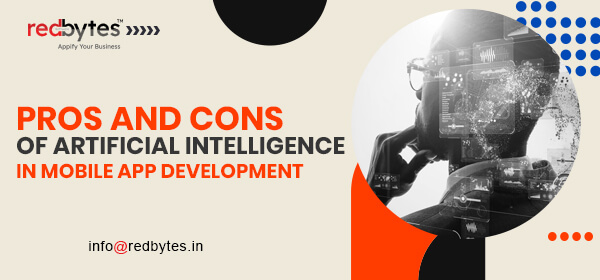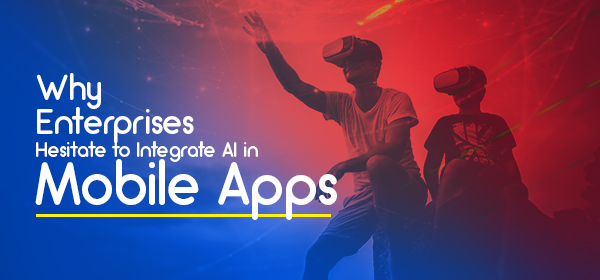The past chaotic decade is the testament to how technologies are changing the paradigm of business executions across the globe. Every now and then, we hear a whole new perspective on how Artificial Intelligence can not only transform but bolster your prospects about business growth. AI is obtrusively, and incessantly, creating new virtual land of opportunities for companies to leverage.
With AI chatbots, virtual assistants and automation constantly making the headlines, we can debunk that AI is no longer a transient wave.
As mobile apps are etched forever on the minds of busy users, adding AI to mobile apps could be a surefire way to stay relevant and intact in the business.
If you still wondering if AI will uplift your business in 2019, we give you 9 good reasons why adding it to your mobile apps is must.
1. AI is a Habit of Convenience
Mobile apps added much convenience already in our life, but users desire to taste more of novel technologies for solving their lifestyle challenges.
Users are therefore welcoming the change driven by AI so much that relying on mundane intelligence has almost become their habit by now.

Alexa, Google Assistant, Siri are a few predominant examples of how users are addicted to depending on AI for things they are likely to forget.
This means your mobile app with AI features will have greater chance to align with user expectations than those without intelligent power.
2. AI is Quite a Trend
It goes without saying that a new technology always enters the vibrant world of young generation. Intelligent technologies with deep learning capabilities make for a hot trend and AI is most likely to be a technology worth every penny of your investment in 2019.
Numerous investors especially from finance, healthcare, gaming and education have already looked to investing in AI with optimistic eye as studies confirm. As more and more apps are joining AI revolution, the technology has found its raging momentum.
3. Value Addition
What is business without value? We live in time when product quality is as important as services offered. In many ways, AI integrated mobile apps help your business add great value to your business proposition, which ultimately boosts brand value and helps market your products via AI-powered service standards.
For instance, it would bring immense value if you have most generic customer queries resolved by the means of AI bots.
4. Data Management and Monetization

AI even creates creative revenue channels through proper utilization of piles of data. Your app not only looks better with intelligent solutions in place but its ability to gather more data from app users also results in tempting more investors for ads.
This means the wealth of data processed by AI software can be monetized in several ways to generate an additional stream of revenues.
5. User experience getting even better
User experience shares equal influence on customer behavior as much as customer service does. Your smart business apps can offer personalized experience to people while they cope with their daily tasks.
Modern users appreciate apps that can suggest choices, remind forgettable routines or place Starbucks orders on your behalf. Enhanced UX in a way means getting a sharp edge over competitors.
6. AI means smart decisions
Apart from monetization, user data from AI can also help analyze what users exactly like, dislike and explore on inside your mobile app.
The insights you gain from the data analytics can help you decide what features and pages of your app are least visited or used and therefore can be eliminated.
In the same way you will know what may charm users more often and hence can be retained.
7. AI supports your economy

AI does not place massive burden on your financial capacity since you can always have a choice to keep those functions you need most in your app.
Being intelligent does not mean drilling a huge hole in your budget especially when you decide to develop AI-enabled features at the beginning of app development phase.
This way, it doesn’t turn out expensive. Additionally, as your app looks unique among others with its outstanding capability, it becomes more remarkable and marketable, bringing you handsome ROI.
8. Voice capability
What makes your mobile app more popular and valuable is adding voice-enabled services. Voice feature sets users free from typing and excessive hassle as they can simply use their voice command to get the job done. These days, apps with voice capability are high in demand.
9. AI embraces IoT

As Internet of Things and AI come together, you can expect high-grade solutions with auto-sensing power.
Today Chromecast apps, fitness apps, Smart home appliances are all run by the apps that are designed with the combination of AI and IoT.
With seamless voice control and IoT- connected devices, users will be able to enjoy multiple integrated apps with more power and automation.
Conclusion
Artificial Intelligence is not just here to take the world by storm with its massive caliber, but it also empowers your business to do, create and deliver more.
You should opt for AI integration in mobile apps, not because the trend is forcing you to do so, but solely because AI is a change welcome heartily by end users and loyal customers.
As the ripples rising in digital market suggests, world’s largest companies have made a pact to develop intelligent apps next year. This could be a great positive inspiration for SMBs to follow the footprints of established leaders and dive smartly into the pool of intelligent solutions.







